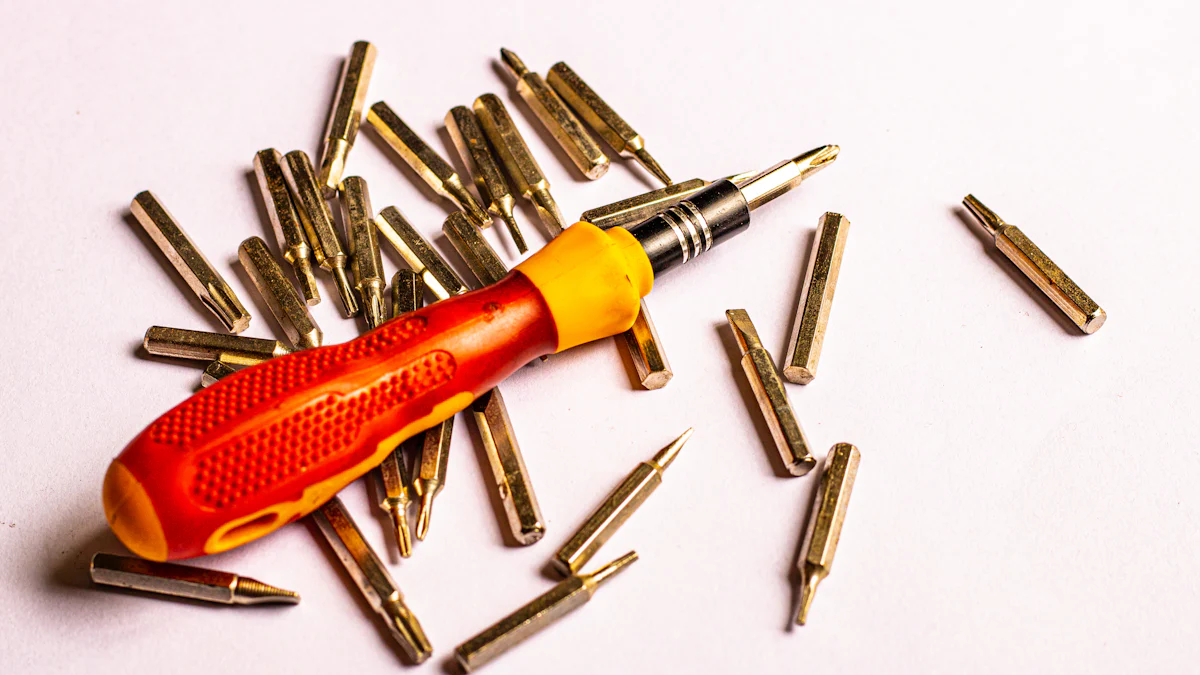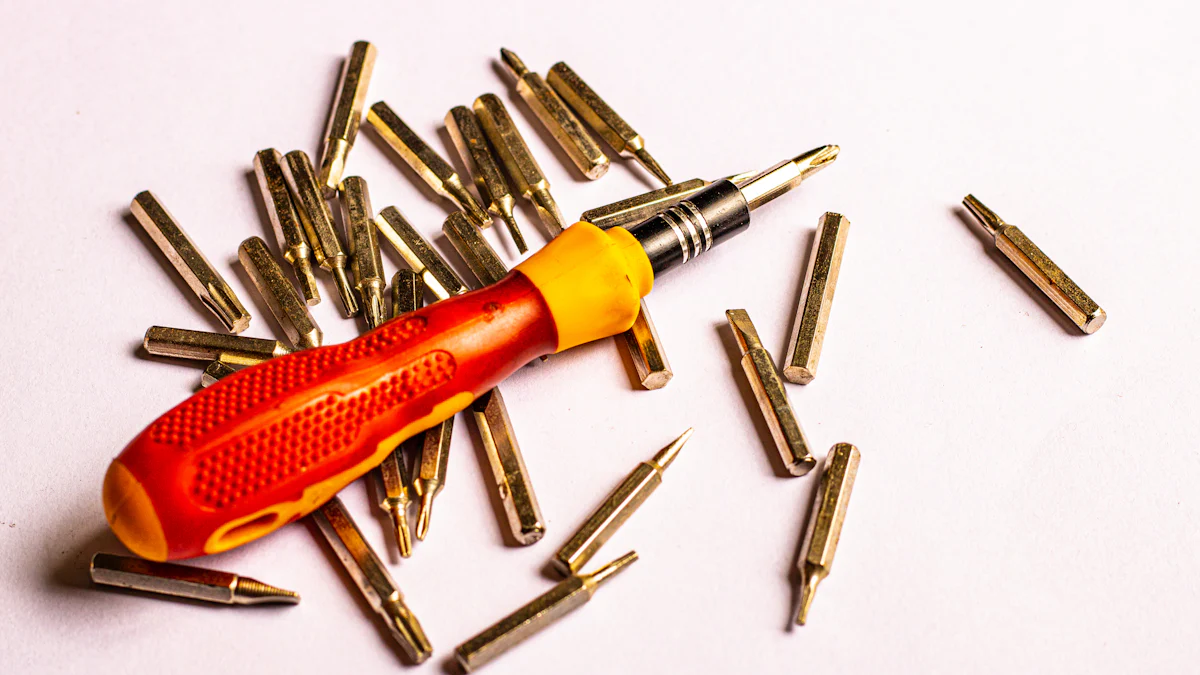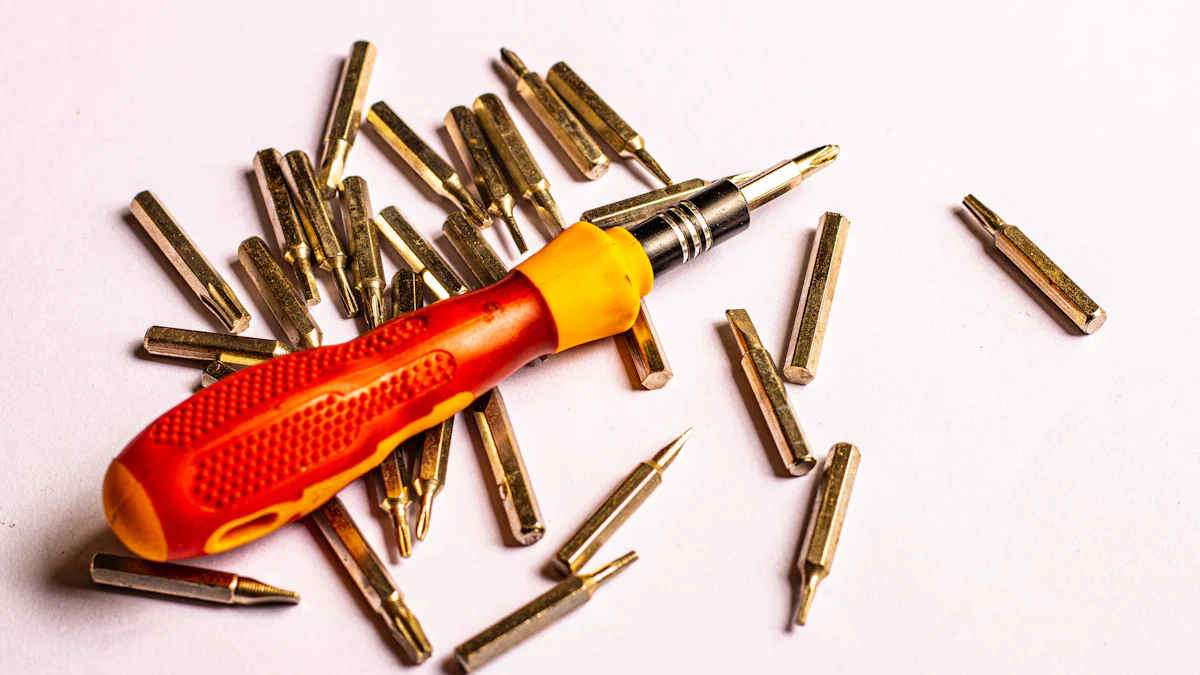
Screwdrivers play a crucial role in many tasks. These tools assist in everything from home improvement projects to professional construction work. Two main types of screwdrivers exist: magnetic and non-magnetic. The question arises: which type is better for different applications? Magnetic screwdrivers offer ease of use by holding screws securely, while non-magnetic ones provide versatility and safety around sensitive electronics. When choosing a holding screwdriver, consider the specific needs of your project to determine the best option.
Understanding Magnetic Screwdrivers

What Are Magnetic Screwdrivers?
Definition and Basic Features
Magnetic screwdrivers feature a magnetized tip. This design allows the tool to attract and hold screws. The magnetism ensures that screws stay attached to the screwdriver during use. Many magnetic screwdrivers come with interchangeable bits, enhancing their versatility.
Common Uses and Applications
Magnetic screwdrivers prove useful in various scenarios. Home improvement projects often benefit from these tools due to their convenience. Professional construction workers also rely on magnetic screwdrivers for efficiency. Additionally, electronic repairs frequently require magnetic screwdrivers to handle tiny screws securely.
Advantages of Magnetic Screwdrivers
Ease of Use
Magnetic screwdrivers offer significant ease of use. The magnetized tip keeps screws in place, reducing the need for manual adjustments. This feature simplifies tasks, especially when working in tight or awkward spaces.
Efficiency in Holding Screws
The ability to hold screws efficiently sets magnetic screwdrivers apart. The secure grip prevents screws from falling out, saving time and effort. Tools like the Amartisan 42-piece Magnetic Screwdriver Precision Set include a magnetizer demagnetizer tool, further enhancing this capability.
Safety Benefits
Safety benefits also accompany the use of magnetic screwdrivers. By keeping screws attached to the tool, users minimize the risk of dropping and losing small parts. This reduces potential hazards during work.
Disadvantages of Magnetic Screwdrivers
Potential for Magnetization of Other Tools
One downside involves the potential for magnetization of other tools. Prolonged exposure can cause nearby tools to become magnetized unintentionally.
Limitations in Certain Environments
Certain environments pose limitations for magnetic screwdrivers. For instance, delicate components like mechanical watches may suffer damage from magnetism.
“Using a magnetic screwdriver on a computer is generally safe as the magnetism is not strong enough to damage components but can help hold screws in place.”
However, caution remains necessary around sensitive electronics.
Issues with Precision and Aim
Precision and aim issues can arise with magnetic screwdrivers. The magnetized tip may stick to surfaces other than the screw head, affecting accuracy during use.
Understanding Non-Magnetic Screwdrivers
What Are Non-Magnetic Screwdrivers?
Definition and Basic Features
Non-magnetic screwdrivers lack a magnetized tip. These tools do not attract screws, making them ideal for certain tasks. Manufacturers often use materials like high-strength copper beryllium alloy or premium-grade stainless steel. These materials ensure durability and effectiveness.
Common Uses and Applications
Non-magnetic screwdrivers excel in environments sensitive to magnetic fields. Delicate electronic repairs benefit from these tools. Medical applications also require non-magnetic screwdrivers to avoid interference with equipment. Professionals working on mechanical watches prefer non-magnetic options.
Advantages of Non-Magnetic Screwdrivers
Versatility in Various Tasks
Non-magnetic screwdrivers offer versatility across different tasks. Users can employ these tools in both home improvement projects and professional settings. The absence of magnetism allows for broader applications.
No Risk of Magnetization
Non-magnetic screwdrivers eliminate the risk of unintended magnetization. Tools nearby remain unaffected by magnetic fields. This feature proves essential in environments where magnetism could cause issues.
Suitability for Sensitive Electronic Work
Sensitive electronic work demands non-magnetic screwdrivers. Components like computer parts and mechanical watches require careful handling. Non-magnetic tools prevent potential damage from magnetic interference.
Disadvantages of Non-Magnetic Screwdrivers
Difficulty in Holding Screws
A significant drawback involves the difficulty in holding screws securely. Users must manually keep screws attached to the tool, which can be cumbersome.
Potential for Increased Work Time
The lack of a magnetized tip may increase work time. Tasks that involve numerous screws might take longer without the assistance of a holding screwdriver.
Limited Use in Certain Scenarios
Certain scenarios limit the use of non-magnetic screwdrivers. Projects requiring frequent holding screwdriver capabilities might find these tools less efficient.
Comparing Magnetic and Non-Magnetic Screwdrivers

Performance in Different Scenarios
Home Improvement Projects
Home improvement projects often require tools that offer convenience and efficiency. Magnetic screwdrivers excel in these scenarios due to the holding screwdriver feature. The magnetized tip keeps screws attached, reducing the need for manual adjustments. This proves beneficial when working in tight or awkward spaces. Non-magnetic screwdrivers, however, may increase work time as users must manually hold screws.
Professional Construction Work
Professional construction work demands robust and reliable tools. Magnetic screwdrivers provide efficiency by securely holding screws in place. This reduces the risk of dropping screws and losing small parts. However, non-magnetic screwdrivers offer versatility across various tasks without the risk of unintended magnetization. Professionals working on delicate components or sensitive equipment often prefer non-magnetic options.
Electronic Repairs
Electronic repairs require precision and care to avoid damaging components. Non-magnetic screwdrivers prove essential for such tasks due to their lack of magnetic interference. Components like computer parts and mechanical watches benefit from non-magnetic tools. Conversely, magnetic screwdrivers can cause issues with precision as the magnetized tip may stick to surfaces other than the screw head.
Cost and Availability
Price Comparison
The cost of magnetic vs. non-magnetic screwdrivers varies based on brand and features. Magnetic screwdrivers often come with additional functionalities like interchangeable bits or a magnetizer demagnetizer tool, which can increase their price. Non-magnetic screwdrivers, especially those made from high-strength materials like copper beryllium alloy or premium-grade stainless steel, also tend to be priced higher due to their specialized nature.
Market Availability
Both types of screwdrivers are widely available in the market. Hardware stores and online retailers offer a range of options for both magnetic and non-magnetic tools. Consumers can find sets tailored for specific needs, such as electronic repair kits featuring non-magnetic screwdrivers or home improvement sets with magnetic options.
User Preferences and Expert Opinions
Survey Results
A survey focusing on user preferences revealed mixed opinions about magnetic vs. non-magnetic screwdrivers:
- 38 customers mentioned ‘Magnetism’:
- 19 positive responses highlighted ease of use.
- 19 negative responses pointed out issues with magnetism strength.
Some users appreciated the convenience provided by holding screwdriver capabilities in magnetic tools, while others found that the magnetism was either too weak or caused unintended problems.
“Customers are mixed about the magnetism of the screwdrivers,” noted one respondent.
Expert Recommendations
Experts recommend choosing a screwdriver based on specific project requirements:
- For general home improvement projects: Experts suggest using magnetic screwdrivers due to their ability to hold screws securely.
- For professional construction work: Both types have merits; however, experts lean towards magnetic options for efficiency.
- For electronic repairs: Experts unanimously recommend non-magnetic screwdrivers to prevent potential damage from magnetic interference.
The blog discussed the key points of magnetic and non-magnetic screwdrivers. Magnetic screwdrivers offer ease of use, efficiency in holding screws, and safety benefits. However, they can magnetize other tools and pose limitations in certain environments. Non-magnetic screwdrivers provide versatility, no risk of magnetization, and suitability for sensitive electronic work. Yet, they struggle with holding screws securely and may increase work time.
For home improvement projects, magnetic screwdrivers excel due to their convenience. Professional construction workers benefit from both types depending on the task. Electronic repairs demand non-magnetic options to avoid damage.
Consider personal needs when choosing between these tools:
- Home Improvement: Magnetic
- Professional Construction: Both
- Electronic Repairs: Non-Magnetic
Evaluate project requirements to make an informed decision.
See Also
Discovering the Assortment of Socks for Males and Females
